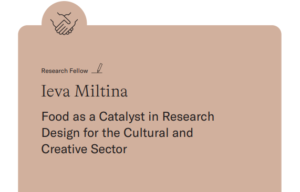Blending food with organized activities opens doors to impactful changes in both individuals and communities. This article highlights how food-related activities hold the potential to achieve specific social goals, demonstrating how food acts as a powerful force for positive transformation. Whether it’s fostering community, promoting intercultural understanding, or raising environmental awareness, food becomes a flexible tool for anyone in youth work as well as any other changemaking aspect.
1. Fostering Community Connection:
Utilizing food in facilitation commonly aims to bring people together and cultivate a sense of community. As quoted by Danielle Wilde (2018), food acts as a “social glue,” effectively binding individuals. From simple community dinners that foster unity, to initiatives like community gardening that target larger challenges, food initiates communal action and bridges societal gaps.
2. Inclusive Engagement:
Food’s familiarity and sensory allure make it a powerful tool to engage marginalized audiences. Workshops targeting homeless individuals’ well-being (Pettinger et al., 2019) and garden therapy for people with disabilities illustrate how food facilitates participation. Its relatability and sensory qualities empower those often less responsive to conventional methods.

3. Cultivating Empowerment and Creativity:
Food’s simplicity creates opportunities for empowerment, creativity, and barrier-breaking. Facilitators can harness its relatability to enable exploration and self-expression, especially among “hard-to-reach” individuals.
4. Intercultural Learning:
Food serves as a conduit for intercultural learning, showcasing diverse culinary traditions and fostering cross-cultural understanding. From intercultural evenings to workshops where immigrants share and cook their traditional dishes, food fuels dialogue and connection.
5. Promoting Environmental Consciousness:
Food-related activities shed light on pressing societal issues, particularly the environmental impact of food systems. Workshops on health, sustainability, and human-food interaction (Dolejšová et al., 2019) amplify awareness and inspire changes in daily habits.

6. Cultivating Sustainable Habits:
Food-related workshops frequently aim to instill healthier and more sustainable habits. From educational activities for kids to zero-waste workshops for chefs, food becomes a channel for teaching responsible consumption and eco-conscious behaviors.
7. Unveiling Future Pathways:
Food can be a tangible tool for social research. Integrating food in design thinking principles (Dolejšová, 2018) and participatory community research (Pettinger et al., 2019) opens innovative avenues for exploring future scenarios and sustainable actions both on topics connected to food as well as to other topics.
If you are working with communities yourself, or looking for new ways to bring change regarding existing challenges – take any of the above described examples and adapt to your needs freely. We genuinely believe that food plays a versatile role in creating social change. It connects people, breaks barriers, increases awareness, encourages sustainable habits, and sparks creativity. As changemakers and facilitators, using food-related activities offers a lively way to bring about meaningful change. By embracing food’s cultural, sensory, and experiential aspects, we can build more inclusive, conscious, and harmonious communities. Food is more than just sustenance—it’s a route to fostering positive transformation and societal progress.
Learn more about food-related facilitation and particular examples on our page.
– – – – – – – – –
Images by: Tom Hermans, Annie Spratt, Lenka Dzurendova from Unsplash.








